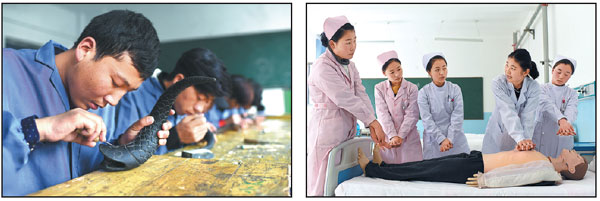Workshop focuses on vocational learning in China
|
Vocational education has been improving with government support in Qinghai province. Young people receive training at an art school and a nursing school. Xinhua |
"There is a Chinese saying - there are no unqualified students, but only unqualified teachers. Sometimes I feel I'm an unqualified teacher. What do you suggest, professor," a vocational education teacher from Central China's Henan province asked US education expert Walter Huber a question during his lecture in Beijing on Sunday.
"Well, you ask this question (which) shows that you are exactly a qualified teacher, a good teacher," Huber answered. Listeners all laughed, nodding.
Over Saturday and Sunday, vocational education experts from the United States and European countries gathered at the 2017 BN Vocational Education Workshop, to offer diagnosis to the weaknesses of China's vocational training through lectures, seminars and demonstration classes to more than 200 secondary vocational school principals and teachers from 14 mid-west Chinese provinces.
Together with representatives from some domestic education research institutes and welfare organizations, participants were actively exploring ways at the weekend workshop to improve the quality of vocational education, so as to better contribute to China's targeted poverty alleviation strategy.
Co-sponsored by China Development Research Foundation, Citi Funds, Hillhouse Funds and BN Vocational School, the workshop used BN vocational schools in cities like the capital city of Beijing, Lijiang in Southwest China's Yunnan province and Yinchuan in Northwest China's Ningxia Hui autonomous region as well as in Angola's capital, Luanda, as examples, and discussed highly targeted topics such as teaching quality evaluation, effective teaching and life skills education.
Chinese and foreign experts also gave demonstration classes on English, horticulture, intelligent building and so on during the workshop.
Zhang Meiying, a former vice-chairwoman of Chinese People's Political Consultative Conference National Committee, said in her opening speech that "vocational education is the cradle of craftsmen".
She points out that poverty alleviation through education, especially targeted poverty alleviation through vocational education, is an important way to serve society and fulfill one's social responsibility.
"Through vocational training, students from poverty-stricken families will gain the ability of self-development, thus reaching the goal of getting out of poverty," Zhang says. "In that sense, vocational education serves as an important weapon in the fight against poverty."
Yao Li, founder of BN Vocational School, says: "In today's Chinese society, vocational education has been widely recognized as an effective way of precise poverty relief."
According to her, since the establishment of BN Vocational School 12 years ago, apart from professional skills training, the school has always been emphasizing on life skills education for the students' sustainable development, enabling them to obtain the ability of self-learning in a fast changing labor market.
Participating principals all agreed that in order to help targeted poverty relief and change the fate of disadvantaged youth, vocational education needs to innovate itself to be more effective and market-oriented to better suit the needs of the job market and the students' long-term development.
"I was shocked to hear the foreign experts' lectures today," Li Wenshun, deputy chief of Leishan County Education Bureau in Southwest China's Guizhou province. "By comparison, I feel some of our education concepts and methods are out-of-date. This kind of workshop is inspiring."
According to Lu Mai, CDRF's secretary-general, China has built the world's largest vocational education system with more than 16 million secondary vocational education students, most of whom come from underprivileged families.
"This is a group of people we should give special care and help to," he says. "We hope secondary vocational education could foster them to become optimistic, healthy people with modern skills."
- Universities explore unique features under 'double first-class' plan
- New Zealand universities eye deficit in Asia-Pacific expertise
- Learning to teach and learn outside the box
- NPC deputy: Education sector in western region needs strong govt support
- Distinctive disciplines play key role in promoting university's global influence



















